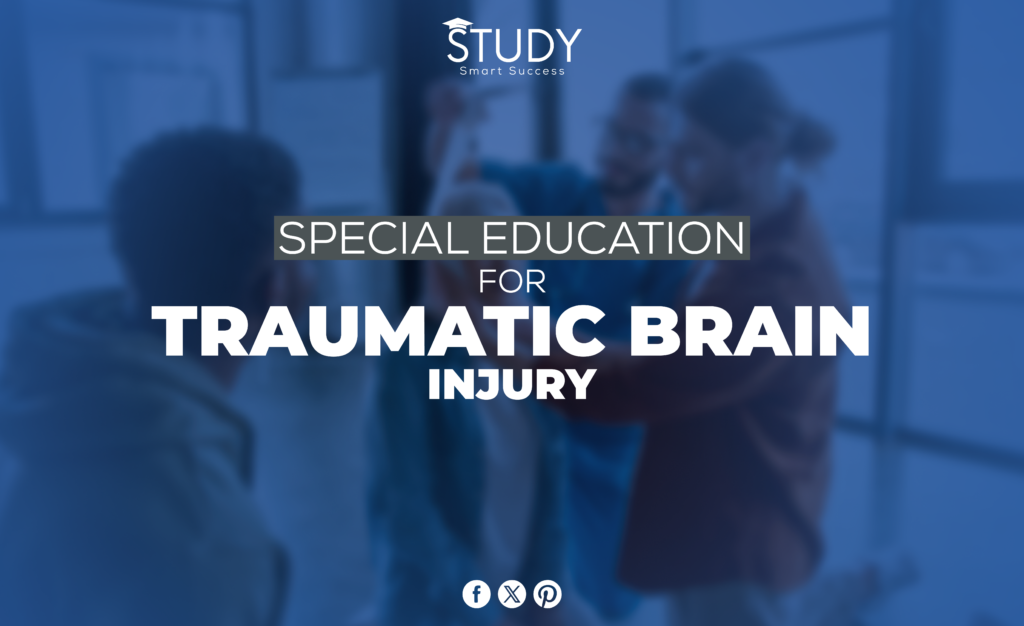Introduction
Traumatic Brain Injury (TBI) is a sudden brain injury. It can result from a head blow, bump, or jolt or a penetrating head injury that impairs brain function. TBI can range from a minor concussion that needs rest and monitoring to a significant injury that requires hospitalization and rehabilitation.
Individualized education programs are essential for TBI survivors. These programs aid in the relearning of cognitive, social, and emotional abilities. TBI special education bridges the gap between medical treatment and daily life to optimize independence and quality of life.
The Traumatic Brain Injury blog will discuss special education. We will examine survivors’ and their families’ concerns, address evidence-based educational techniques to help recovery and adaptation, and showcase success stories demonstrating resilience and the power of specialized educational interventions. After reading this blog, readers will understand why special education is essential for TBI recovery and how to implement it.
Understanding Traumatic Brain Injury
Definition and Causes of TBI
Traumatic Brain Injury (TBI) is when an outside force changes how the brain works or shows other signs of brain damage.
Some possible reasons for TBI are:
- Falls: This is the most prevalent TBI cause, especially in children and seniors. Slipping or falling from beds, stairs, or ladders can cause it.
- Vehicle-related collisions: Head injuries that lead to TBI can happen in car, motorbike, bicycle, or pedestrian accidents.
- Violence: TBIs can result from gunshot wounds, interpersonal violence, or child abuse. Shaken infant syndrome is a childhood TBI.
- Sports injuries: Football, boxing, soccer, skating, and hockey can cause TBI from head strikes or collisions.
- Explosive blasts and military combat injuries: For military members, blasts from explosives can cause TBI from the pressure waves that go through the brain.
- Other impacts: TBI can happen if you hit something or fall against something, like hitting your head on the ground or getting hit by something.
Common Symptoms and Challenges
TBI symptoms vary by intensity and brain region. Headaches, dizziness, tiredness, and coordination and balance issues may occur. Cognitive symptoms include focus, memory, communication, and executive function issues. Changes in mood, behaviour, and coping techniques are emotional problems. These symptoms can make daily life and school difficult.
Impact of TBI on Learning and Development
The effects of Traumatic Brain Injury (TBI) on learning and development can be profound and multifaceted, influencing many elements of education:
- Cognitive Challenges: Attention, concentration, and information processing may be problematic for TBI patients. This makes learning new concepts difficult, and short-term memory loss makes it worse. Thus, typical teaching methods and classroom environments may need to be revised for TBI students.
- Behavioural and Social Adjustment: After injury, students may exhibit impulsivity, irritability, withdrawal, social issues, and classroom management. Schools need specialized behavioral management to address frustration with new learning and socializing concerns that may cause these behavioral changes.
- Physical Limitations: Depending on severity and location, TBI can cause motor skill impairments, tiredness, and sensory processing difficulties in students. Physical restrictions may prevent them from participating in certain educational activities or necessitate changes in the learning environment.
Legal Framework and Rights
Overview of Relevant Laws (e.g., IDEA, Section 504)
US special education legislation covers TBI. The federal IDEA provides impaired children with universal services. Under IDEA, states and governments provide early intervention, special education, and services. The Rehabilitation Act of 1973’s Section 504 bans handicap discrimination in federally financed programs. It involves giving disabled students equal educational opportunities and advantages.
Rights and Protections for Students with TBI
These laws protect the education of TBI students. IDEA requires public schools to develop IEPs for disabled students. Section 504 Plans can accommodate children with disabilities that impede learning and other key life activities. Both criteria stress a free, adequate public education (FAPE) in the least restrictive context.
Individualized Education Programs (IEPs) and 504 Plans
IEPs and 504 Plans help TBI students. Special education kids in public schools receive an IEP that includes their performance, educational needs, goals, quantifiable targets, and services. Although less extensive than an IEP, a 504 Plan addresses the student’s adjustments, resources, and supports to make education accessible and equitable. Family, educators, and students must work together to ensure both plans fit student needs.
Special Education Assessment and Evaluation
Traumatic Brain Injury (TBI) survivors’ educational needs must be assessed thoroughly. The IEP or 504 Plan relies on this assessment to customize educational interventions to the student’s strengths and weaknesses.
Importance of Comprehensive Evaluation
- Holistic Approach: Traumatic Brain Injury students should be evaluated for academic skills, cognitive functioning, emotional well-being, and physical health. This broad perspective helps identify all student support and accommodation needs.
- Team Collaboration: The evaluation team should comprise educators, psychologists, therapists, medical specialists, and the student’s family. This collaborative approach ensures a comprehensive view of the student’s requirements and uses various expertise to create an effective assistance plan.
- Use of Multiple Assessment Tools: Multiple assessment methods should be used to grasp a student’s strengths and weaknesses fully. Standardized tests, observations, interviews, and task-based evaluations can reveal a student’s functional ability.
- Continual Reevaluation: Regular reevaluations are crucial since a student’s needs may alter, especially after an injury. This ensures educational plans meet students’ changing requirements and encourage academic and personal development.
Assessment Tools and Techniques for TBI
Multiple evaluation tools and techniques are needed to effectively assess a student with Traumatic Brain Injury (TBI)’s educational needs. This includes:
- Neuropsychological Assessments: Comprehensive examinations of a student’s cognitive, behavioural, and emotional functioning are essential for understanding TBI’s effects on learning and behaviour.
- Academic Assessments: These assessments assess students’ reading, writing, math, and other academic skills to discover learning gaps and strengths.
- Functional Assessments: These assessments evaluate the student’s daily life and school performance to see if accommodations or modifications are needed.
- Observational Assessments: Observing a student in numerous circumstances can help educators and professionals understand how TBI affects social interactions, attentiveness, and real-life behaviour.
Collaborating with Specialists and Healthcare Providers
Neurologists, psychologists, occupational therapists, and speech-language pathologists work together to evaluate and plan for TBI pupils. These specialists can assess students’ needs and suggest instructional options and adjustments.
Effective Instructional Strategies
Differentiated Instruction for Students with TBI
Differentiated instruction adapts content, methods, materials, and assessments to student requirements. Teaching kids with Traumatic Brain Injury (TBI) may require adaptable tactics to their cognitive and emotional changes. These students can learn and retain with multi-sensory instruction, task breakdown, and frequent feedback.
Assistive Technology and Tools for Learning
TBI students can overcome academic difficulties and gain independence using assistive technology. Text-to-speech, voice recognition, and electronic organizers can help with reading, writing, scheduling, and task management. Specialized software can help pupils with memory, attention, and executive function, enabling them to participate more in school.
Universal Design for Learning (UDL) Principles
Scientific study of human comprehension optimizes learning in the Universal Design for Learning (UDL) paradigm. UDL recommends distinct representation, action, expression, and engagement methods for TBI kids. These can include teaching in diverse formats, allowing pupils to exhibit their talents, and offering engaging options. To help TBI students succeed, teachers can apply UDL concepts to make learning more inclusive and accessible.
Creating Inclusive Learning Environments
Students with Traumatic Brain Injury (TBI) need an inclusive learning environment to feel encouraged and reach their potential. This inclusive environment promotes intellectual, social, and emotional well-being.
Building Positive Classroom Culture
Positive classroom culture is essential for inclusive and supportive learning. This means ensuring that all students are appreciated and valued regardless of ability or challenge. Teachers can do this by promoting classroom empathy, understanding, and respect. Teaching conflict resolution and open communication can also make children feel safe and supported.
Peer Support and Social Integration
Social integration of TBI kids depends on peer assistance. Buddy systems and peer mentoring can help TBI children form meaningful relationships with their classmates and feel more connected. Group projects and cooperative learning activities foster teamwork and expose students to other viewpoints and talents.
Educating Peers and Staff about TBI
Traumatic Brain Injury education for peers and staff is essential for inclusion—it requires understanding TBI-related tiredness, attention, and noise sensitivity. Awareness and training may minimize preconceptions and stigma and build a supportive culture that helps TBI students. Teachers may assist TBI kids in feeling included in all school activities by encouraging empathy and compassion.
Addressing Behavioral and Emotional Needs
Traumatic Brain Injury (TBI) pupils’ treatment and education must address their behavioural and emotional requirements. TBI complicated these demands, requiring specific methods and assistance.
Understanding Behavioral Challenges Associated with TBI
After TBI, student behavior affects learning and relationships. Impulsivity and emotional dysregulation can cause spontaneous statements or actions. Social cues and connections may also make friendships and chats with peers and adults challenging for students.
Finally, TBI can reduce frustration tolerance and increase impatience, making classroom stress and disappointments harder for students. Managing these behavioral issues needs patience, empathy, and individualized treatment for TBI students.
Positive Behavior Support Strategies
Positive Behavior Support adequately addresses TBI behavioral difficulties. Supportive environments, alternative behavior education, and positive reinforcement are used. Understanding their causes helps educators adjust the environment or routine to prevent problem behavior. Teaching kids coping skills and improved methods to express their needs and frustrations might reduce bad behavior.
Counselling and Mental Health Support
After a TBI, students’ emotional well-being and self-perception may require counseling and mental health care. Professional counseling can help students express themselves, overcome obstacles, and create resilience. School-based mental health initiatives like therapy and support groups can help youngsters cope with TBI and emotions. These therapies help TBI students recover emotionally and psychologically.
Transition Planning and Life Skills Development
Traumatic Brain Injury (TBI) students need transition planning and life skills development. This process comprises setting goals, creating a plan to reach them, and giving students the skills and support they need to succeed in post-secondary school.
Transition Services for Students with TBI
Transition programs help TBI students transition to post-secondary, vocational, work, continuing and adult education, adult services, independent living, or community participation. These services should reflect each student’s skills, interests, and preferences. Community resources, adult assistance organizations, career counseling, job shadowing, internships, and other work-based experiences can aid transition preparedness.
Building Independent Living Skills
TBI students need independent living skills for independence and fulfillment. These skills include personal budgeting, health, safety, household management, and effective communication. Schools and real-world applications can strengthen these skills. TBI kids can make judgments and solve everyday problems, preparing them for adulthood.
Vocational Training and Career Readiness
Transition planning for TBI students requires vocational training and career preparation. These programs help students develop job-specific skills, explore career options, and understand professional expectations. Employment coaching, job exploration programs, and vocational exams can help TBI students discover their passions and develop professional skills. Local businesses and organizations can help these students find internships and jobs.
Conclusion
This publication emphasizes the need for a sophisticated approach to serving students with Traumatic Brain Injury (TBI).
Early identification and individualized educational plans are essential, as well as addressing cognitive and emotional problems, positive behaviour support, transition planning, and life skills development. These elements create a conducive learning environment that meets TBI students’ requirements.
Support and advocacy are crucial for TBI kids’ academic and personal success. Teachers, caregivers, and community advocates must ensure these students receive the modifications and support they need to succeed. Awareness and understanding make education more inclusive and supportive.
Medical research, educational research, and technology will define TBI special education. Better strategies, treatments, and supports require continual collaboration between educators, healthcare providers, and researchers. To maximize their potential and ensure their effective social integration, TBI students’ education will be more customized and evidence-based.


